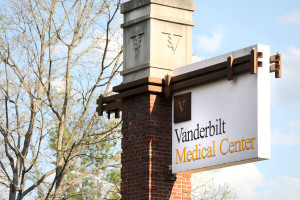by
John R. Fischer, Senior Reporter | May 23, 2023

Vanderbilt University Medical Center has teamed up with Philips to reduce its carbon footprint. (Photo courtesy of VUMC)
Vanderbilt University Medical Center is looking to tamp down energy consumption in its radiology department’s MR, CT, ultrasound, and X-ray scanner use, teaming up with Philips in a project to mitigate its carbon footprint by developing tactics that it can share with other healthcare providers.
As part of this endeavor, VUMC will supply radiology and equipment energy consumption data to Philips, which will analyze operational workflow efficiency and interview staff and faculty to come up with computational models to run simulations that provide insights for developing potential interventions to reduce VUMC’s carbon footprint.
“Working together will allow us to leverage Philips’ general healthcare and specific radiology expertise — as well as their own success in achieving CO2 net-zero operations — to make important reductions in our carbon footprint,” said Dr. Reed Omary, Carol D. and Henry P. Pendergrass Professor and chair of radiology at Vanderbilt University Medical Center, in a statement.



Ad Statistics
Times Displayed: 1901
Times Visited: 8 Fast-moving cardiac structures have a big impact on imaging. Fujifilm’s SCENARIA View premium performance CT brings solutions to address motion in Coronary CTA while delivering unique dose saving and workflow increasing benefits.
The healthcare industry contributes 7.6% of U.S. and 4.4% of global CO2 emissions, with radiology a significant contributor due to its heavy energy, equipment, and supply use. According to Philips’ 2023 Future Health Index, nearly half of U.S. healthcare leaders plan to share their best practices and learnings to make their profession more sustainable.
Earlier this year, Philips became the first health technology company to gain approval for its entire value-chain CO₂ emissions reduction targets by the Science Based Targets initiative (SBTi) with strategic action plans. The company helped 40% of its suppliers commit to science-based targets, such as the Paris Agreement 1.5⁰C (34.7⁰F) target, putting it on track to achieve its 50% supplier commitment target for 2025.
For example, it entered into another partnership back in March to
cut in half the carbon footprint of Portugal’s Champalimaud Foundation, resulting from the use of its diagnostic and interventional imaging equipment, by 2028.
The company became carbon neutral across its internal and energy sourcing emissions, reducing energy consumption, waste, and materials and substances usage by embedding its EcoDesign criteria and circular business models within production development and operations, and has worked closely with partners and customers to mitigate the environmental impact of in-use diagnostic imaging technology.
“We are optimistic that results from this partnership will not only assist Vanderbilt in its effort to understand and address carbon emissions in its own radiology department, but serve as a model for others seeking to decarbonize their operations,” said Jeff DiLullo, chief region leader of Philips North America.
Based in Tennessee, VUMC is the largest comprehensive research, teaching and patient care health system in the Mid-South region, treating over three million patients annually.
VUMC was unable to respond for comment.

